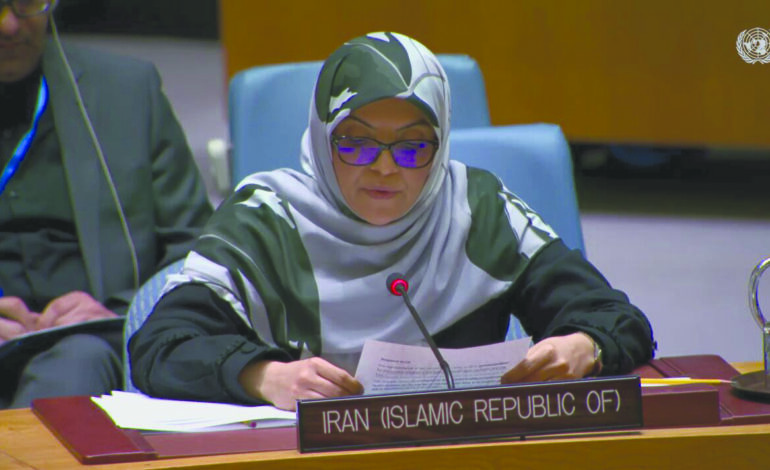On Wednesday, the United States, Britain and France opposed a Russian-drafted U.N. Security Council statement that would have condemned an attack on Iran’s embassy compound in Syria, which Tehran has blamed on Washington’s ally Israel.
Press statements by the 15-member council have to be agreed to by consensus. Diplomats said the U.S., backed by France and Britain, told council colleagues that many of the facts of what happened on Monday in Damascus remained unclear and there was no consensus among council members during a meeting on Tuesday.
“This serves as a clear illustration of the double standards employed by the Western ‘troika’ and their actual, rather than declarative, approach to legality and order in the international context,” Russia’s deputy U.N. Ambassador Dmitry Polyanskiy said in a post on X.
The U.N. Security Council has issued statements in the past condemning attacks on diplomatic premises. The European Union condemned the strike on Wednesday — saying the inviolability of diplomatic and consular premises and personnel must be respected — and called on countries to show restraint.
The U.S. says it has not confirmed the status of the building struck in Damascus, but that it would be concerned if it was a diplomatic facility.
Israel has not claimed responsibility for the attack, which destroyed a consular building adjacent to the main embassy complex, killing seven members of Iran’s Revolutionary Guards.
Iran has accused Israel of violating the founding U.N. Charter, international law and also cited several conventions.
The 1961 Vienna Convention governing diplomatic relations and 1963 Vienna Convention on Consular Relations define premises as buildings, parts of buildings and land — regardless of ownership — used for the purposes of the diplomatic or consular mission, including the head of the diplomatic mission.
Those conventions state that the diplomatic or consular premises “shall be inviolable.” But they also say the premises should “not be used in any manner incompatible” with the diplomatic and consular functions.
Iran also cited the 1973 Convention on the Prevention and Punishment of Crimes Against Internationally Protected Persons, including Diplomatic Agents — suggesting those killed were covered by these rules.
Iran vows to punish Israel for deadly strike on its embassy in Syria
On Tuesday, Iran warned Israel that it will retaliate for an air strike that killed seven Revolutionary Guards, two of them generals, and destroyed its consular annex building in the Syrian capital.
Israel declined to comment on Monday’s strike in Damascus, which fueled Middle East tensions already inflamed by the Gaza war and violence involving Iran-backed groups in Lebanon, Syria, Iraq and Yemen.
Iranian state media said 13 people were killed in the strike, in which, according to Tehran’s ambassador, Israeli F-35 fighter-jets fired six missiles that levelled the five-story consular building adjacent to the embassy.
After repeated defeats and failures against the faith and will of the Resistance Front fighters, the Zionist regime has put blind assassinations on its agenda in the struggle to save itself. – Iranian President Ebrahim Raisi
The building was reduced to a mountain of rubble by the blasts which blew out windows in nearby buildings and incinerated cars parked on the roadside in a leafy and upscale suburb of the city.
Iran’s supreme leader, Ayatollah Ali Khamenei, vowed that Israel, “will be punished at the hands of our brave men. We will make them regret this crime and the other ones.”
Iranian President Ebrahim Raisi condemned the attack as a “clear violation of international regulations”, which “will not go unanswered.”
“After repeated defeats and failures against the faith and will of the Resistance Front fighters, the Zionist regime has put blind assassinations on its agenda in the struggle to save itself,” Raisi said on his office’s website.
Iran has also charged that the United States, Israel’s main backer, bore responsibility, even as an unidentified U.S. official quoted by the news site Axios insisted Washington “had no involvement” or advanced knowledge of it.
Iran’s Foreign Minister Amir-Abdollahian said on X that the ministry had summoned a diplomat from the Swiss embassy, which looks after U.S. interests in Iran.
“An important message was sent to the American government as a supporter of the Zionist regime,” he said in the post. “America must be held accountable.”






Leave a Reply